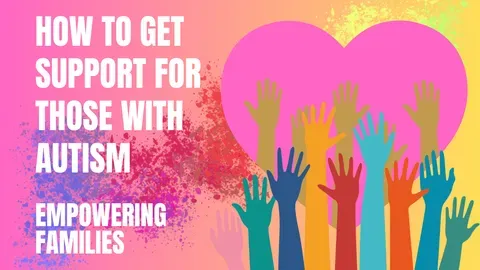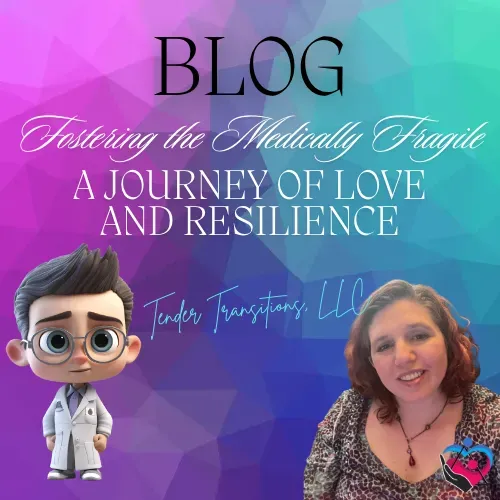Where and How to Get Support for Those with Autism
As an Autism Parenting Coach, I'm often asked about where and how families can find support for individuals with Autism Spectrum Disorder (ASD). Autism is a developmental disorder that affects communication, behavior, and social interaction, and it can present unique challenges for individuals and their families. However, with the right support and resources, individuals with ASD can thrive and lead fulfilling lives. In this blog, we will explore where and how families can find support for individuals with ASD, from a positive parenting perspective.

Empowering Families
Seek Professional Help
The first step in getting support for individuals with ASD is to seek professional help. This may include consulting with a pediatrician, a child psychologist, a developmental pediatrician, or a speech and language therapist, among others. These professionals can provide assessments, diagnoses, and tailored treatment plans to address the specific needs of individuals with ASD. They can also offer guidance and support to families in navigating the challenges associated with ASD.
Connect with Autism Organizations
There are numerous organizations that specialize in providing support and resources for individuals with ASD and their families. These organizations can offer valuable information, advocacy, and community connections. Some well-known organizations include Autism Speaks, Autism Society, and the Autism Self-Advocacy Network. These organizations often provide online resources, support groups, workshops, and events that can help families learn more about ASD and connect with other families facing similar challenges.
Join Support Groups
Joining support groups can be immensely beneficial for families of individuals with ASD. Support groups can provide emotional support, practical advice, and a sense of community. They offer a safe space for families to share their experiences, challenges, and successes with others who understand and can relate. Support groups can be found online, through local community organizations, or through autism organizations mentioned above. Joining a support group can be a powerful way to gain insights, receive guidance, and build meaningful connections with other families.
Access Educational Resources
Educating oneself about ASD can empower families to better understand and support individuals with ASD. There are numerous educational resources available, such as books, websites, online courses, and workshops, that provide valuable information about ASD, its characteristics, and evidence-based interventions. These resources can help families develop effective strategies for managing behaviors, communication challenges, and social interactions, and empower them to advocate for their loved ones with ASD.
Collaborate with Schools and Educators
For individuals with ASD who are of school age, collaborating with schools and educators is crucial. Schools can provide support through special education programs, individualized education plans (IEPs), and accommodations tailored to the needs of individuals with ASD. Building a collaborative relationship with educators can help families ensure that their loved ones with ASD are receiving appropriate support and accommodations in the educational setting.
Practice Positive Parenting
Positive parenting is an approach that emphasizes building a strong, supportive, and nurturing relationship with the child, while also setting clear expectations and boundaries. For individuals with ASD, positive parenting can be especially beneficial, as it focuses on strengths, encourages autonomy, and promotes healthy communication. Positive parenting can help families establish a positive and empowering environment at home, where individuals with ASD feel understood, respected, and supported.
Foster Self-Advocacy
Empowering individuals with ASD to become self-advocates is essential for their long-term success. Encouraging self-advocacy involves teaching individuals with ASD to understand their strengths, challenges, and rights, and to express their needs and preferences. Families can support self-advocacy by providing opportunities for individuals with ASD to make choices, participate in decision-making, and develop their own self-awareness and self-advocacy skills.
Wrapping it Up
Finding support for individuals with Autism Spectrum Disorder (ASD) is crucial for their well-being and success. It's important to approach support with empathy, understanding, and a strengths-based mindset. Seeking professional help, connecting with autism organizations, joining support groups, accessing educational resources, collaborating with schools and educators, practicing positive parenting, and fostering self-advocacy are all powerful ways to support individuals with ASD and their families.
Remember, each individual with ASD is unique, and what works for one person may not work for another. It's important to be open to trying different strategies and approaches, and to tailor support based on the individual's strengths, needs, and preferences. Building a strong support network and utilizing available resources can make a significant difference in the lives of individuals with ASD and their families.
If you are a parent or caregiver of an individual with ASD, know that you are not alone. Reach out for support, connect with others who understand, and empower yourself with knowledge and resources. With the right support and advocacy, individuals with ASD can thrive and achieve their full potential. Remember to practice self-care as well, as caring for yourself is essential in order to effectively support your loved one with ASD.
SCHEDULE A FREE AUTISM PARENTING COACHING CALL WITH AUTISM PARENTING COACH, NISHONI HARVEY, TODAY!

